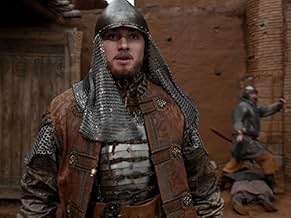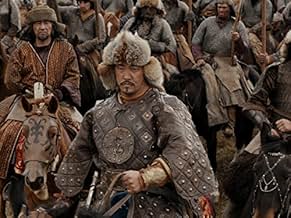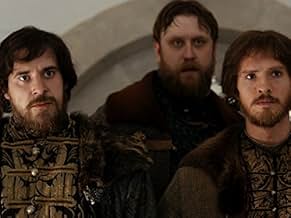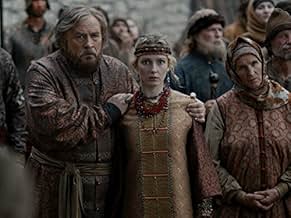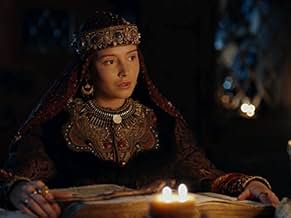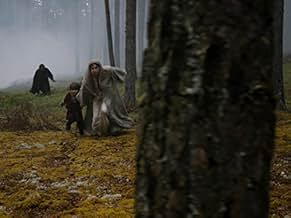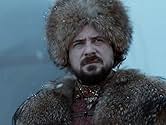Dans la Russie du XVe siècle, la princesse byzantine Sophia Palaiologina épouse le tsar Ivan III. Surmontant les intrigues, elle aide Ivan à unifier la Russie, à expulser les envahisseurs mo... Tout lireDans la Russie du XVe siècle, la princesse byzantine Sophia Palaiologina épouse le tsar Ivan III. Surmontant les intrigues, elle aide Ivan à unifier la Russie, à expulser les envahisseurs mongols et à construire l'emblématique Kremlin.Dans la Russie du XVe siècle, la princesse byzantine Sophia Palaiologina épouse le tsar Ivan III. Surmontant les intrigues, elle aide Ivan à unifier la Russie, à expulser les envahisseurs mongols et à construire l'emblématique Kremlin.
- Récompenses
- 4 victoires et 10 nominations au total
Parcourir les épisodes
Avis à la une
I love this series. The scenery is beautiful and the acting is great. It is a very good portrayal of a part of Russian history that I knew nothing about. But the title is Sofia. And she is at best a supporting character. The series focuses much more on the Male characters.
This series is not only absolutely gorgeous and fascinating to look at (not just the costumes, but ALL of the sets and even the make-up -- or the authentic-looking lack thereof) but extraordinarily entertaining, intelligently produced, and beautifully acted. Neither American nor British television (including the BBC) has EVER produced anything half this good.
I don't care about historical accuracy (and I disagree with reviewers who say you need to research the history in order to enjoy this series), but I care very much about historical believability, and there is not a single frame or word or movement that feels like anything but 15th century Russia.
There is much thoroughly believable drama, but not ANY melodrama, which is what sets it miles apart from American and even British productions. It's like a time machine, letting me watch these people living their lives as they really lived them more than 500 years ago. It seems so real and so true that I'm amazed when I remember occasionally that these are 21st-century actors only pretending to be historical persons.
I don't care about historical accuracy (and I disagree with reviewers who say you need to research the history in order to enjoy this series), but I care very much about historical believability, and there is not a single frame or word or movement that feels like anything but 15th century Russia.
There is much thoroughly believable drama, but not ANY melodrama, which is what sets it miles apart from American and even British productions. It's like a time machine, letting me watch these people living their lives as they really lived them more than 500 years ago. It seems so real and so true that I'm amazed when I remember occasionally that these are 21st-century actors only pretending to be historical persons.
10Cir666ce
First, I must echo other reviewers-- this is an experience that leaves you longing for more. The plot, complex as it can be, is nevertheless easy to follow and totally engaging. The acting is superb--never did I feel that I was watching "a performance." The characters were far too convincing and complex. The settings capture both the splendor and the squalor of the period.
Do you need to brush up on Russian history first? If you are not familiar with the reign of Ivan III, I suggest watching the series first and learning the facts afterward. Yes, there is much of the epic and the mythic here, but there are also truths transcending accuracy. Critique the historical elements once you have yielded to the world in which the series creates.
Even the subtitles were not bothersome, and unlike many translations, this one was idiomatic and (I think) correct.
Well worth a binge. My sole quibble is that Zoe/Sophia is just too entirely good and "the villain" (unnamed here) just too relentlessly bad. The flaws and virtues of every other character are conveyed, giving the series depth and verisimilitude.
I am no fan or scholar of Russian history, so I was initially reluctant to invest time in the series. Not only did my viewing teach me a lot, however--It made me hungry to learn more.
Do you need to brush up on Russian history first? If you are not familiar with the reign of Ivan III, I suggest watching the series first and learning the facts afterward. Yes, there is much of the epic and the mythic here, but there are also truths transcending accuracy. Critique the historical elements once you have yielded to the world in which the series creates.
Even the subtitles were not bothersome, and unlike many translations, this one was idiomatic and (I think) correct.
Well worth a binge. My sole quibble is that Zoe/Sophia is just too entirely good and "the villain" (unnamed here) just too relentlessly bad. The flaws and virtues of every other character are conveyed, giving the series depth and verisimilitude.
I am no fan or scholar of Russian history, so I was initially reluctant to invest time in the series. Not only did my viewing teach me a lot, however--It made me hungry to learn more.
The Russian TV miniseries Sofiya (2016) was shown in the U.S. with the anglicised title Sophia. The series was directed by Vyacheslav Ross and Aleksey Andrianov. Mariya Andreeva is superb in the title role of Sophia Palaiologina, who was a Byzantine princess.
By the time the movie begins--in the late 15th century--Constantinople had been conquered by the Turks. Sophia and her family had escaped to Rome, where they were treated well by the Pope and a cardinal.
Her marriage was arranged with Ivan III, Prince of Muscovy. It was thought that her influence would be enough to lead Russia, which was Eastern Orthodox, back to Roman Catholicism. We learn immediately that four years in Rome had not permanently changed Sophia's belief in Eastern Orthodoxy. Once she crossed into Russia, she returned to her original faith.
One plot of the movie is agents of the Pope trying to kill Sophia. Another is the castle intrigues, heresies, and political infighting. (We call such matters Byzantine for a reason, but they were not restricted to the Byzantine Empire.)
We heard a lecture about the historical Sophia, and as far as I can tell, the plot of the miniseries is historically accurate in the overall sense. Whether the dialog actually played out in real life the way it did on the screen is beyond my knowledge.
Incidentally, the lecturer called the movie a soap opera. Well, yes and no. Most miniseries could be called soap operas if you think of them that way. Episode one--crisis, then resolution, then a teaser. Episode two--crisis, then resolution, then a teaser. Downton Abbey was a soap opera too, if that's how you define soap opera.
My thought is that this is a miniseries about a fascinating episode in Russian history, well acted and well directed. Other raters agreed with me, because Sophia has a very high IMDb rating of 7.8. I thought it was even better than that, and rated it 9.
By the time the movie begins--in the late 15th century--Constantinople had been conquered by the Turks. Sophia and her family had escaped to Rome, where they were treated well by the Pope and a cardinal.
Her marriage was arranged with Ivan III, Prince of Muscovy. It was thought that her influence would be enough to lead Russia, which was Eastern Orthodox, back to Roman Catholicism. We learn immediately that four years in Rome had not permanently changed Sophia's belief in Eastern Orthodoxy. Once she crossed into Russia, she returned to her original faith.
One plot of the movie is agents of the Pope trying to kill Sophia. Another is the castle intrigues, heresies, and political infighting. (We call such matters Byzantine for a reason, but they were not restricted to the Byzantine Empire.)
We heard a lecture about the historical Sophia, and as far as I can tell, the plot of the miniseries is historically accurate in the overall sense. Whether the dialog actually played out in real life the way it did on the screen is beyond my knowledge.
Incidentally, the lecturer called the movie a soap opera. Well, yes and no. Most miniseries could be called soap operas if you think of them that way. Episode one--crisis, then resolution, then a teaser. Episode two--crisis, then resolution, then a teaser. Downton Abbey was a soap opera too, if that's how you define soap opera.
My thought is that this is a miniseries about a fascinating episode in Russian history, well acted and well directed. Other raters agreed with me, because Sophia has a very high IMDb rating of 7.8. I thought it was even better than that, and rated it 9.
This series is really great and I really enjoyed it but it is much more about ivan iii and his mother with a little bit thrown in about Sofia
Meilleurs choix
Connectez-vous pour évaluer et suivre la liste de favoris afin de recevoir des recommandations personnalisées
- How many seasons does Sophia have?Alimenté par Alexa
Détails
- Durée52 minutes
- Couleur
Contribuer à cette page
Suggérer une modification ou ajouter du contenu manquant



